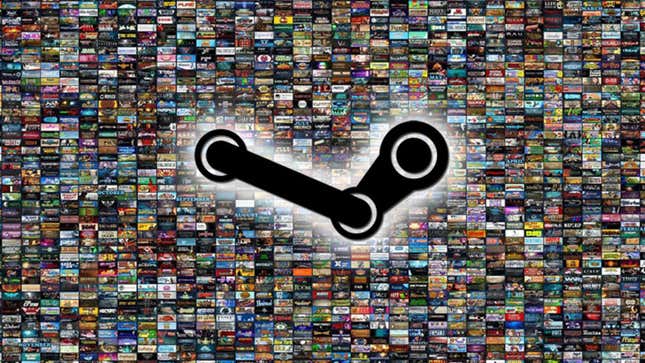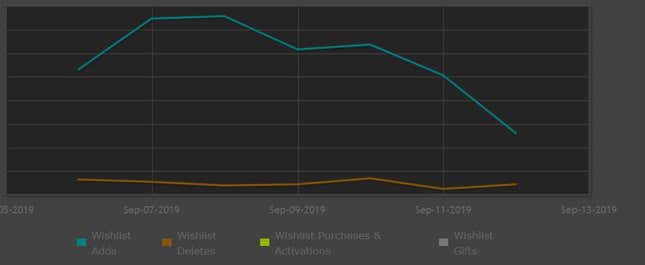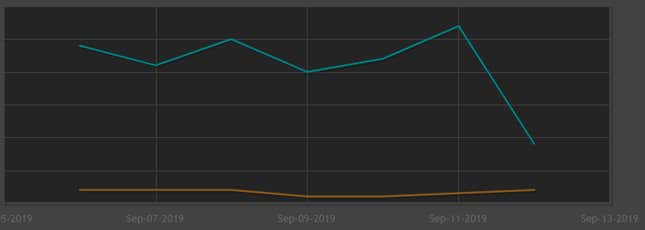
Last week, Valve released an update as part of a recent push to make it easier for users to find new, under-the-radar games. The update purported to decrease the presence of popular games in Steam’s recommendation algorithms, increase overall variety, and give people a more personalized selection of games. However, the update appears to have produced some unintended ripple effects, especially for games that aren’t out yet. Now some developers are saying the trickles of traffic their game pages were getting before have now dried up almost entirely.
Over the weekend, a bunch of indie developers voiced their concerns on Twitter, posting graphs of their plummeting wishlist stats and citing sudden drop-offs in store page traffic. The developers of atmospheric puzzle-platformer Unbound: Worlds Apart kicked it off with their own graph of users’ wishlist numbers, which is not moving in a promising direction:

“Thank you Steam for killing indie gaming,” wrote Unbound’s developers.
Mark Viola, the creator of tactical turn-based JRPG Bright Red Skies, lamented similar data, writing, ““Noticed a huge drop as well.”

ScourgeBringer developer Thomas Altenburger called the new update a “catastrophe,” saying that his rogue-lite platformer’s daily wishlisting dropped by 66 percent—an “all time low.”
“Months of effort, ruined in an instant,” he wrote.
Other developers reached out to Kotaku with similar stories. “Our impressions and wishlists have dropped 80% since the change, and it’s a similar story with tons of others,” Alex M-O, a developer on action-platformer Rune Fencer Illyia, told Kotaku on Twitter.
“Our upcoming game went from 30-40 wishlists daily to negative numbers today,” said Failcore Games founder Jan Cieslar. “Thanks to the changes, more people are deleting [the game from] their wishlists than adding them. And it’s Steam who tells us to set up a page as soon as possible and prioritize wishlists if we want to succeed.”
“Our traffic and wishlists [dropped] to 20% of the normal one, and the conversion from view to wishlist has also dropped to 50%, which means they are showing our games to people from other niches or people who already saw them,” said Lowpoly Interactive founder Bogdan Radu.
Both store page impressions and wishlists are extremely important predictors of Steam games’ success, especially upcoming ones. The value of page impressions is pretty self-explanatory, but when users wishlist games, they receive notifications from Steam when the game comes out, as well as every time it goes on sale. That way, it doesn’t get lost in Steam’s ceaseless howling vortex of a shuffle. Wishlists are generally regarded by developers as the most effective way of making a game sell to its fullest potential when it comes out.
The developers who say their games have entered flaming traffic talespins have something in common: Their games aren’t out yet. A couple of developers behind games that are already out have said that their internal Steam stats are in a holding pattern or slightly up. Still, that’s done little to comfort the developers, who—in addition to their own long-term marketing efforts—had been relying on Steam’s recommendations to pull in pre-release wishlists.
“For example, a game like Hollow Knight,” wrote the developers of Unbound. “In the ‘More Like This’ section from the game page, they put only popular games and no smaller games. Moreover, games that will be launched in the near future are currently inexistent there, and this section brings the biggest organic traffic.”
I took a look at the version of the store Steam algorithmically generated for me and found this to largely be true. I had to scroll for multiple minutes through the recommendations section to find a game I didn’t recognize or that had failed to achieve some degree of high-profile success. While I did come across a couple compelling indies in the “More Like This” sections of recent cult hits like Hypnospace Outlaw and Wandersong, even many smaller games’ “More Like This” widgets were dominated by indie mega-hits, well-known classics, and barely-related triple-A games. Unreleased games, meanwhile, were nowhere to be found.
In a statement to Kotaku, Valve said that the update is “likely” to undergo further changes, but they may not necessarily be directed at this particular issue. “We’re monitoring the effects of the changes now that they’ve been deployed on a larger scale, and we’re reviewing the mix of feedback from all sources,” said a Valve representative in an email. “It’s too early to say what changes will be made, but new features and tweaks are always likely after initial release.”
In the meantime, indie developers with upcoming games on Steam are left in the cold.
“It’s a pretty clear pattern,” said M-O. “Upcoming games are given negative priority for visibility. ‘More Like This’ is roughly 50% relevant best-sellers, 50% non-relevant best-sellers, and a random [triple-A game] or two... It’s comedically opposite to their stated intention.”